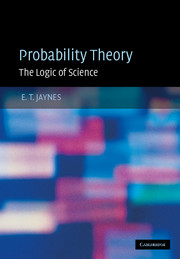Book contents
- Frontmatter
- Contents
- Editor's foreword
- Preface
- Part I Principles and elementary applications
- 1 Plausible reasoning
- 2 The quantitative rules
- 3 Elementary sampling theory
- 4 Elementary hypothesis testing
- 5 Queer uses for probability theory
- 6 Elementary parameter estimation
- 7 The central, Gaussian or normal distribution
- 8 Sufficiency, ancillarity, and all that
- 9 Repetitive experiments: probability and frequency
- 10 Physics of ‘random experiments’
- Part II Advanced applications
- Appendix A Other approaches to probability theory
- Appendix B Mathematical formalities and style
- Appendix C Convolutions and cumulants
- References
- Bibliography
- Author index
- Subject index
10 - Physics of ‘random experiments’
from Part I - Principles and elementary applications
Published online by Cambridge University Press: 05 September 2012
- Frontmatter
- Contents
- Editor's foreword
- Preface
- Part I Principles and elementary applications
- 1 Plausible reasoning
- 2 The quantitative rules
- 3 Elementary sampling theory
- 4 Elementary hypothesis testing
- 5 Queer uses for probability theory
- 6 Elementary parameter estimation
- 7 The central, Gaussian or normal distribution
- 8 Sufficiency, ancillarity, and all that
- 9 Repetitive experiments: probability and frequency
- 10 Physics of ‘random experiments’
- Part II Advanced applications
- Appendix A Other approaches to probability theory
- Appendix B Mathematical formalities and style
- Appendix C Convolutions and cumulants
- References
- Bibliography
- Author index
- Subject index
Summary
I believe, for instance, that it would be very difficult to persuade an intelligent physicist that current statistical practice was sensible, but that there would be much less difficulty with an approach via likelihood and Bayes' theorem.
G. E. P. Box (1962)As we have noted several times, the idea that probabilities are physically real things, based ultimately on observed frequencies of random variables, underlies most recent expositions of probability theory, which would seem to make it a branch of experimental science. At the end of Chapter 8 we saw some of the difficulties that this view leads us to; in some real physical experiments the distinction between random and nonrandom quantities is so obscure and artificial that you have to resort to black magic in order to force this distinction into the problem at all. But that discussion did not reach into the serious physics of the situation. In this chapter, we take time off for an interlude of physical considerations that show the fundamental difficulty with the notion of ‘random’ experiments.
An interesting correlation
There have always been dissenters from the ‘frequentist’ view who have maintained, with Laplace, that probability theory is properly regarded as the ‘calculus of inductive reasoning’, and is not fundamentally related to random experiments at all. A major purpose of the present work is to demonstrate that probability theory can deal, consistently and usefully, with far more than frequencies in random experiments.
Information
- Type
- Chapter
- Information
- Probability TheoryThe Logic of Science, pp. 314 - 340Publisher: Cambridge University PressPrint publication year: 2003
Accessibility standard: Unknown
Why this information is here
This section outlines the accessibility features of this content - including support for screen readers, full keyboard navigation and high-contrast display options. This may not be relevant for you.Accessibility Information
- 1
- Cited by
